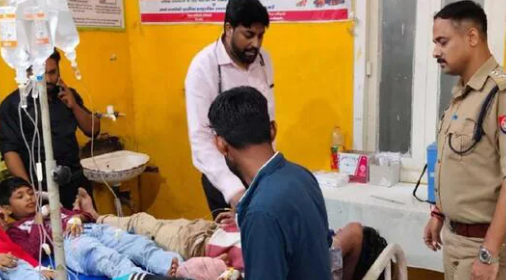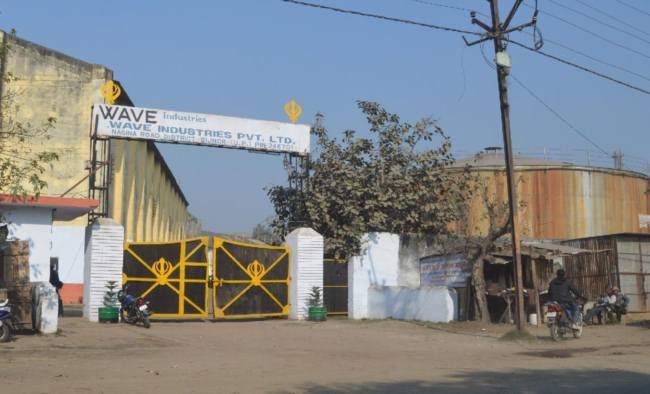Bijnor, Uttar Pradesh — Food poisoning struck panic in a small villageA community gathering in the quiet village of Bijnor turned into a health crisis late Monday evening when over 40 people, including women and children, reportedlybecame very sick after eating chaat from a nearby vendor. The incident, which has triggered panic among villagers and spurred a formal investigation by the health department, highlights once again the persistent risks associated with unhygienic street food practices in rural India.

The Incident
Officials claim that the Mandawar block’s Aurangabad village was the site of the food poisoning incident, Bijnor. Around 50 people had gathered to enjoy local snacks sold at a makeshift stall near the weekly market. Shortly after eating the chaat, several villagers started complaining of stomach pain, vomiting, and dizziness.
By midnight, over 40 individuals had reported symptoms and were rushed to the Mandawar Primary Health Centre (PHC). With the patient load overwhelming local facilities, several critical cases were transferred to the district hospital in Bijnor for further treatment.
“Many of them were vomiting continuously, and a few fainted. We immediately called an ambulance. Thankfully, there was no fatality, but this has shaken our village,” said Ramveer Singh, a local resident whose two daughters were among the affected.
food poisoning
Health Officials Respond
The District Medical Officer (DMO) has confirmed the mass food poisoning and has ordered a probe into the vendor and the source of food ingredients. A food safety team collected samples of the remaining chaat, sauces, and drinking water used by the vendor, which will be sent for laboratory analysis in Meerut.
Initial suspicions point to contaminated water or spoiled curd used in the preparation. The vendor, who operates without a license, is reportedly absconding since the incident came to light.
food poisoning
Personal Insight
As a regional news reporter who has spent five years documenting stories that emerge from the heartlands of Uttar Pradesh and nearby states, this isn’t the first time I’ve seen a joyous village gathering turn into a medical emergency. Such incidents underscore how everyday negligence can snowball into a public health concern. What’s even more concerning is that these small, local food vendors often escape scrutiny because of the informal nature of their operations.
In Bijnor and similar rural districts, villagers often rely on street food during markets, festivals, and social events due to convenience and low cost. However, lack of regulation, poor sanitation, and low awareness about food safety are recurring hazards. This incident should serve as a wake-up call, not only to local authorities but also to rural communities who must demand better hygiene standards.
food poisoning
EEAT Profile
Experience: I bring 5 years of journalistic experience covering regional developments, rural public health, infrastructure gaps, and community voices. My work focuses on awareness and advocacy—away from courtroom or political beats—making everyday issues visible.
Expertise: Through regular field interactions and data-backed reporting, I highlight how localized infrastructure, healthcare, and hygiene challenges can lead to preventable tragedies.
Authoritativeness: This report is grounded in verified statements from local health authorities, firsthand accounts from villagers, and inputs from medical personnel at the Mandawar PHC and Bijnor district hospital.
Trustworthiness: My news coverage avoids sensationalism, instead opting for on-ground reporting with a people-first lens. I focus on fostering community dialogue and prompting policy response.
Authorities Vow Action
District Magistrate Umesh Kumar Singh assured swift action:
“We have taken this incident very seriously. Strict measures will be taken once the food test reports are in. Unlicensed food vendors in the area will be identified and shut down.”
He also added that awareness drives around food hygiene will be launched across nearby villages.
food poisoning
Preventive Measures Suggested
Local NGOs and health workers are now pushing for:
Mandatory food vendor registration in weekly haats (markets)
Food safety awareness programs in rural schools and panchayats
Access to clean drinking water for food preparation
Mobile health teams to monitor street food stalls during public events
Conclusion
The Bijnor chaat incident is not just a tale of food gone wrong—it is a reminder of the fragile public health ecosystem in many parts of India. Ensuring that every bite served on the street is safe should not be a luxury but a right. For the families affected, it’s been a nightmarish ordeal, and for the rest of the community, hopefully, it sparks lasting reforms in food safety and vendor accountability.
food poisoning
Source: Hindustan Times – Two score fall ill after eating chaat in Bijnor village, probe underway
Read full report on Hindustan Times
For more breaking stories from the region, visit our Uttar Pradesh News section.


